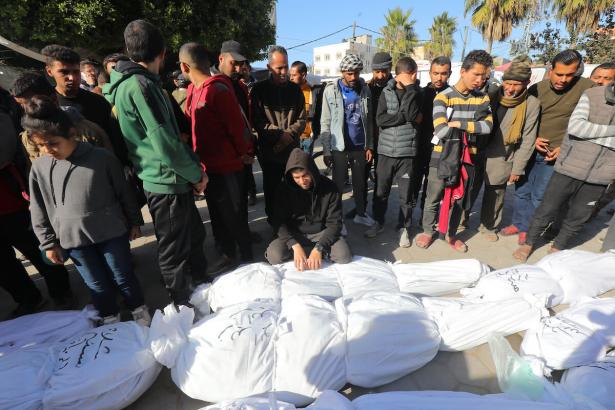GENEVA (15 February 2024) – The Special Rapporteur on the situation of human rights in the Palestinian territories occupied since 1967, Francesca Albanese, said today that Israel’s decision to symbolically ban her entry is a distraction from atrocities being committed in Gaza. She issued the following statement:
“Since Israel’s 2008 detention and deportation of then UN Special Rapporteur Richard Falk, the State of Israel has prevented the entry of all UN Special Rapporteurs on the situation of human rights in the Palestinian territories occupied since 1967. Israel’s recent announcement to ‘officially ban’ my entry is therefore symbolic and misleading.
Israel’s announcement must not serve as a diversion from the situation in Gaza, which Under-Secretary-General for Humanitarian Affairs and Emergency Relief Coordinator Martin Griffiths has qualified as ‘an assault that is unparalleled in its intensity, brutality and scope’ and that the International Court of Justice has said plausibly constitutes genocide. In just over four months, the Israeli army has killed over 28,500 Palestinians in Gaza, 70% of them women and children, while some 10,000 people are missing, presumed dead under the rubble. Nearly 70,000 are injured, many maimed for life, and some 1.7 million people–75% of the population—have been displaced, while the entire civilian population is at risk of starvation. Daily, relentless massacres, the latest ones inflicted in the non-existent “safe zones” in Rafah, where over 1.4 million Palestinians are struggling to survive, are being committed in flagrant defiance of the provisional measures ordered by the International Court of Justice.
Israel claims that the ban follows my comments concerning the context in which Hamas’ attacks on 7 October took place. My comments were prompted by the French President’s description of the attacks as ‘the largest anti-Semitic massacre of our century’. I have strongly and consistently condemned these heinous attacks as war crimes, which cannot be justified in any way, and for the fear and distress they have spread among Israelis. I continue to express my sorrow and solidarity with the victims, including the hostages still held captive, and with Jewish communities worldwide. I also call for accountability for these crimes.
While my condemnation of the attacks is unequivocal, I also felt compelled to challenge a persistent misinterpretation of the root causes of the 7 October attacks, particularly in Western countries: that the attacks were primarily motivated by anti-Semitism. As prominent Holocaust and anti-Semitism scholars have warned, this assumption is both false and dangerous as it evades the critical underpinnings of the conflict and disavows the role of Israel in fuelling it. These scholars have recently argued that ‘appealing to the memory of the Holocaust obscures our understanding of the antisemitism Jews face today, and dangerously misrepresents the causes of violence in Israel-Palestine.’ So, while anti-Semitism could have played a role in the attacks at an individual level for some, their main determinants are to be found elsewhere.
Context does matter. As UN Secretary-General António Guterres stated: ‘It is important to also recognise the attacks by Hamas did not happen in a vacuum. The Palestinian people have been subjected to 56 years of suffocating occupation’.
Fundamentally, no crime ever justifies another crime. There is no justification for the horrific attacks of 7 October. However, the ‘56 years of suffocating occupation’ referred to by the Secretary-General is the very context that fuels the hatred and violence that endangers Israelis and Palestinians alike. This context is obscured by the framing of 7 October as primarily driven by anti-Semitism.
In line with the Code of Conduct for Special Procedures Mandate Holders, since the early days of my mandate, I have sought to establish formal relations with the State of Israel that would enable me to fulfil the task entrusted to me by the Human Rights Council. Unfortunately, Israel has responded with hostility and slander that is often amplified by politically aligned organisations and media.
As a Member State of the United Nations, Israel is obligated to respect international law and uphold the values of the Universal Declaration of Human Rights and the UN Charter, which enshrine rights and freedoms for all human beings. Regrettably, the Israeli government consistently undermines the leading promoters and defenders of the rule of law, humanitarian protection and human rights, including the UN Secretary-General, the Human Rights Council and its mechanisms and independent experts, UNRWA, OCHA and the International Court of Justice.
The primacy of the rule of law forms the foundation of the United Nations’ existence and mission—and Israel, like any other State, is called upon to abide by these standards. This includes the facilitation of my access to the territory it has occupied for 56 years.
Although a long and challenging endeavour, respecting international law and ending the system of apartheid that Israel imposes on the Palestinians is the only way to achieve lasting peace, human security and regional stability—for no one can be safe until everyone is safe.”
Ms. Francesca Albanese was appointed the Special Rapporteur on the situation of human rights in the Palestinian territories occupied since 1967.
Special Rapporteurs are part of what is known as the Special Procedures of the Human Rights Council. Special Procedures, the largest body of independent experts in the UN human rights system, is the general name of the Council’s independent fact-finding and monitoring mechanisms. Special Procedures mandate-holders are independent human rights experts appointed by the Human Rights Council to address either specific country situations or thematic issues in all parts of the world. Special Procedures experts work on a voluntary basis; they are not UN staff and do not receive a salary for their work. They are independent of any government or organisation and serve in their individual capacity.


Spread the word